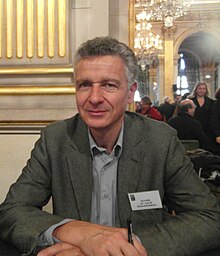Olivier Le Cour Grandmaison
Olivier Le Cour Grandmaison | |
|---|---|
 Olivier Le Cour Grandmaison in 2015. | |
| Born | 19 September 1960 |
| Nationality | French |
Olivier Le Cour Grandmaison (born 19 September 1960), is a French political scientist and author whose work chiefly centres on colonialism. He is best known for his book Coloniser, Exterminer - Sur la guerre et l'Etat colonial.
Le Cour Grandmaison is a professor of
Coloniser, Exterminer
In his book Coloniser, Exterminer (2005), Le Cour Grandmaison states that techniques and concepts used during the period of late 19th-century
"In France I have often heard people I respect, but do not approve, deplore [the army] burning harvests, emptying granaries and seizing unarmed men, women and children. As I see it, these are unfortunate necessities that any people wishing to make war on the Arabs must accept... I believe the laws of war entitle us to ravage the country and that we must do this, either by destroying crops at harvest time, or all the time by making rapid incursions, known as raids, the aim of which is to carry off men and flocks"[2]
"Whatever the case, continued Tocqueville, we may say in a general manner that all political freedoms must be suspended in Algeria."[3]
According to LeCour Grandmaison, "De Tocqueville thought the conquest of Algeria was important for two reasons: first, his understanding of the international situation and France’s position in the world, and, second, changes in French society."[4] Tocqueville, who despised the July Monarchy (1830–1848), believed that war and colonization would "restore national pride, threatened, he believed, by "the gradual softening of social mores" in the middle classes. Their taste for "material pleasures" was spreading to the whole of society, giving it "an example of weakness and egotism". Applauding the methods of Thomas Robert Bugeaud, Tocqueville went as far as saying that "war in Africa" had become a "science":
"...war in Africa is a science. Everyone is familiar with its rules and everyone can apply those rules with almost complete certainty of success. One of the greatest services that Field Marshal Bugeaud has rendered his country is to have spread, perfected and made everyone aware of this new science".[4]
LeCour Grandmaison states that techniques employed by the French army during the 1954-62
State racism
Following the views of Michel Foucault, LeCour Grandmaison spoke of a "state racism" under the French Third Republic, notable by the example of the 1881 Indigenous Code applied in Algeria. Replying to the question "Isn't it excessive to talk about a state racism under the Third Republic?", he replied:
"No, if we can recognize "state racism" as the vote and implementation of discriminatory measures, grounded on a combination of racial, religious and cultural criteria, in those territories. The 1881 Indigenous Code is a monument of this genre! Considered by contemporary prestigious jurists as a "juridical monstruosity", this code planned special offenses and penalties for "Arabs". It was then extended to other territories of the empire. On one hand, a state of rule of law for a minority of French and Europeans located in the colonies. On the other hand, a permanent state of exception for the "indigenous" people. This situation lasted until 1945."[1]
23 February 2005 law
Olivier LeCour Grandmaison was one of a number of historians who criticized the
Bibliography
Major works
- (in French) (with C. Wihtol de Wenden), Les Citoyennetés en Révolution (1789-1794), PUF, 1992 (thesis –- preface of Madeleine Rebérioux)
- (in French) Les étrangers dans la cité. Expériences européennes, Paris, La Découverte, 1993
- (in French) Le 17 octobre 1961 – Un crime d’État à Paris, collectif, Éditions La Dispute, 2001.
- (in French) Haine(s) – Philosophie et Politique, PUF, 2002 (preface by Étienne Balibar) (article on this book)
- (in French) Coloniser, Exterminer - Sur la guerre et l'Etat colonial, )
- (in French) La République impériale. Politique et racisme d'Etat, Fayard, 2009.
- (in French) Douce France. Rafles. Rétentions. Expulsions, Seuil/Resf, 2009.
- (in French) De l'indigénat. Anatomie d'un "monstre" juridique:le droit colonial en Algérie et dans l'empire français, Zones/La Découverte, 2010. free access http://www.editions-zones.fr/spip.php?page=lyberplayer&id_article=113
Articles
- LeCour Grandmaison, Olivier (June 2001). "Torture in Algeria: Past Acts That Haunt France - Liberty, Equality and Colony". Le Monde diplomatique.
- Cohen, William B. 1941. "The Algerian War and the Revision of France's Overseas Mission". Muse Project.
{{cite news}}: CS1 maint: numeric names: authors list (link) - LeCour Grandmaison,Olivier. "De Tocqueville aux massacres d'Algériens en octobre 1961" (in French).
- "17 Octobre 1961, Olivier La Cour-Grandmaison : le silence n'est plus de mise". L'Humanité (in French). 17 October 2001.
- "Méthodes de guerre (Coloniser, Exterminer)". L'Humanité (in French). 12 February 2005.
- "Le Cour Grandmaison, Haine et politique". L'Humanité (in French). 10 March 2003.
- "Entretien avec Olivier LeCour Grandmaison" (in French). El Watan. 19 March 2005.
See also
- Colonialism
- French rule in Algeria
- Paris massacre of 1961
- Holocaust
References
- ^ a b Olivier LeCour Grandmaison (2 February 2005). "Le négationnisme colonial". Le Monde (in French). Archived from the original on 28 February 2006.
- ^ Olivier LeCour Grandmaison (June 2001). "Torture in Algeria: Past Acts That Haunt France - Liberty, Equality and Colony". Le Monde diplomatique. (quoting Alexis de Tocqueville, Travail sur l’Algérie in Œuvres complètes, Paris, Gallimard, Bibliothèque de la Pléiade, 1991, pp 704 and 705.
- ^ Olivier LeCour Grandmaison (2001). "Tocqueville et la conquête de l'Algérie" (in French). La Mazarine.
- ^ a b Olivier LeCour Grandmaison (June 2001). "Torture in Algeria: Past Acts That Haunt France - Liberty, Equality and Colony". Le Monde diplomatique.
- ^ "L'art militaire dans tous ses états". L'Humanité (in French). 18 January 2006.
- ^ "Les guerres et l'État colonial français". L'Humanité (in French). 28 December 2004.
- ^ Olivier LeCour Grandmaison (30 March 2005). "Le colonialisme a la peau dure" (in French). Libération. Retrieved 1 May 2006.
